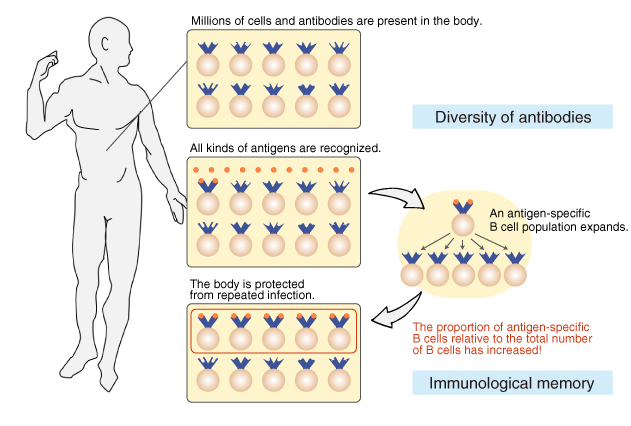With a full-length protein antigen there will typically be multiple B cells generating antibodies against multiple epitopes from different regions of the protein. Antibodies are produced by a type of white blood cell called a B cell B lymphocyte.
 Kyowa Kirin Therapeutic Antibodies Preparation Of Therapeutic Antibody
Kyowa Kirin Therapeutic Antibodies Preparation Of Therapeutic Antibody
It is the production site for antibodies that is activated in the presence of a particular antigen.

Where are antibodies produced. The variable region of the heavy chain differs in antibodies produced by different B cells but is the same for all antibodies produced by a single B cell or B cell clone. Antibodies also called immunoglobulins or gamma-globulins are made in a type of white blood cell called B-cells. The animal is immunized repeatedly to obtain higher titers of antibodies specific for the antigen.
The variable region of each heavy chain is approximately 110 amino acids long and is composed of a single Ig domain. When activated the B cells develop into plasma cells that generate the antibodies. B cells develop from stem cells in bone marrow.
Antibodies are produced by specialized white blood cells called B lymphocytes or B cells. A negative result means no while borderline results are considered inconclusive. The resulting hybridoma cells are cultured and continue to produce antibodies to the antigen.
How many antibodies are produced. The mature B cells called plasma cells secrete millions of antibodies into the bloodstream and lymphatic system. There are several different kinds of antibodies and typically vaccines are designed to produce the antibodies that recognize and tag viruses as foreign invaders by binding to unique parts of a virus.
Antibodies bind to specific antigens on pathogens. Antibodies being produced from another animal for a pathogen and are injected into the bloodstream to produce immunity as long as they remain in circulation. Within a few weeks these polyclonal antibodies can be harvested and collected from the antiserum.
This binding can inhibit pathogen infectivity by blocking key extracellular sites such as receptors involved in host cell entry. An antibody is a Y-shaped protein produced by B cells which are part of the immune system. Antibodies arent found anywhere in the body in large numbers but when an antigen belonging to a pathogen binds to the receptors on a B-cellso called because they are formed in the bone marrow this stimulates cell division by mitosis.
Antibodies are produced by plasma cells but once secreted can act independently against extracellular pathogen and toxins. A positive result means yes the test has detected the antibody or antigen. When B cells become activated due to the presence of a particular antigen they develop into plasma cells.
In contrast polyclonal antibodies bind to multiple epitopes and are usually. Monoclonal antibodies mAbs are produced by introducing an antigen to a mouse and then fusing polyclonal B cells from the mouses spleen to myeloma cells. From immune B cells.
Blood isolated from these animals contains polyclonal antibodies multiple antibodies that bind to the same antigenin the serum which can now be called antiserum. A monoclonal antibody mAb or moAb is an antibody made by cloning a unique white blood cellAll subsequent antibodies derived this way trace back to a unique parent cell. These lymphocytes may be from a mouse or rat.
Specific antibodies are produced by injecting an antigen into a mammal such as a mouse rat rabbit goat sheep or horse for large quantities of antibody. Plasma cells create antibodies specific to a certain antigen. These antibodies can then be collected directly in the serum or by isolating the individual B cells that produce antibody against the epitope of interest.
Antibody tests do not detect the actual pathogens that cause an infectionthey detect the antibodies that are produced in response to the infection. In the in vitro method antibodies are produced using the hybridoma method where hybridoma cells are generated by fusing myeloma cells and B-lymphocytes. Polyclonal antibodies are typically produced by injecting an animal with the antigen stimulating an immune response and then extracting the animals plasma to produce antibodies en masse.
The B cell is a type of white blood cell that develops from the stem cells in the bone marrow. They are in the blood stream lymph. When an antigen binds to the B-cell surface it stimulates the B cell to divide and mature into a group of identical cells called a clone.
Monoclonal antibodies can have monovalent affinity binding only to the same epitope the part of an antigen that is recognized by the antibody. Polyclonal antibodies are produced by injecting a specific antigen into lab animals such as rabbits and goats etc.